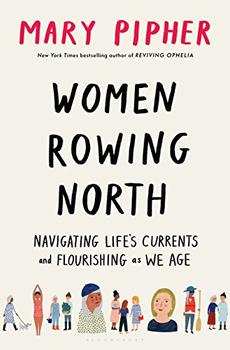Book Club Discussion Questions
Want to participate in our book club? Join BookBrowse and get free books to discuss!
Please be aware that this discussion guide will contain spoilers!
- The book's title, Women Rowing North, evokes the common metaphor of life as a stream and also the visual of navigating the current, both as a single kayaker and in community as a larger crew of supportive women. Before beginning this book, how would you have described your life? What does your vessel look like, your stream's current, your crewmates? A lone dinghy on the open sea? A river cruise in full swing? Has that view changed by the conclusion of this book?
- Each chapter starts with a small collection of quotes. Which, if any, provoked strong emotions of agreement or disagreement, and why?
- In the introduction, Dr. Pipher discusses the extended life expectancy in various countries, the difference between being young-old and old-old, and how the shift from one to another is based on life experiences rather than chronological time. How would classify yourself and why?
- In the introduction, Dr. Pipher shares what she considers to be the core foundation for happiness, such as emotional resilience, positive attitudes, gratitude, and intentionality. Do you agree? What else would you add?
- The author describes an experience where she finds a cholla cactus with branches dying even as new growth flourished and compares it to the experience of growing older. In looking at your own life, what new offshoots are flourishing?
- Dr. Pipher quotes a seventy-year-old friend as saying, "I'm invisible now. I could take off all my clothes and walk through the courthouse and I'm not sure anyone would notice." Do you feel this is true? Why or why not? In thinking back through your own life, who were the visible older women in your life, and what did they do to make themselves seen and heard?
- In early chapters, Dr. Pipher talks of crucible moments and of the transformations that can come from defining events. What crucible moments have defined your life, and how have they changed you?
- In Chapter Eight, the author tells her niece, "You can't navigate from there to here if you don't know where you are." She then ties that advice to knowing ourselves before we chart our course. Each woman's path is unique, but which of the women in the stories most resembled you? Independent Kestrel? Accommodating Emma? Career-driven Willow? Overburdened Sylvia?
- The same chapter also discusses the difficulty in saying no and the freedom in using that word judiciously. Do you find it difficult to say no? How can you set reasonable limits for yourself?
- Chapter Nine discusses intentionality, especially intentionality in wealth, whether that be financial wealth or an abundance in other resources. One definition of wealth Dr. Pipher offers is "the number of people I am in loving relationships with." How do you define wealth?
- In discussing how to build a good day, Dr. Pipher explains the difference between a minimizer and a maximizer. A minimizer is happy with "good enough" while a maximizer, always wants a little more. Which category do you fall into? What are the advantages and disadvantages of both categories?
- On page 149, Dr. Pipher writes "We can slowly train ourselves to think in stories that allow us to flourish. We hone our skills in perspective taking, emotional processing, and reframing. Stories of joy, kindness, and courage empower us in ways that the culturally stereotyped narrative never does." Think back to a difficult time in your life. What narrative did you craft in the moment? How did it affect how you reacted? And, in looking back, has that narrative changed over time?
- Dr. Pipher looks at the different kind of happiness, from joy to contentment to excitement to deep-rooted meaningfulness. When evaluating your own happiness, which of these (or another kind you define) are you most focused on? Has your definition changed over your lifetime, and if so, what's changed it?
- Part of who we become is rooted in our experiences from childhood onward, in the people we have met, and in the choices we've made. Few of us have become who we set out to be. Think of who you were in a crucial time of life—as a young child, as an uncertain adolescent, as an independent young adult, or as a middle-aged woman. What would that version of you think of who you've become today? What would she like? Be surprised by? What are your proudest areas of growth?
- Near the end of the book, the author's friend Sally exclaims, "Getting old is a freaking privilege!" Do you agree or disagree, and has that view changed at all while reading Women Rowing North?
Recommended reading
Another Country: Navigating the Emotional Terrain of Our Elders by Mary Pipher
Seeking Peace: The Chronicles of the Worst Buddhist in the World by Mary Pipher
I Remember Nothing: And Other Reflections by Nora Ephron
Somewhere Towards the End: A Memoir by Diana Athill
Ammonites and Leaping Fish: A Life in Time by Penelope Lively
This Chair Rocks: A Manifesto Against Ageism by Ashton Applewhite
Unless otherwise stated, this discussion guide is reprinted with the permission of Bloomsbury USA. Any page references refer to a USA edition of the book, usually the trade paperback version, and may vary in other editions.
